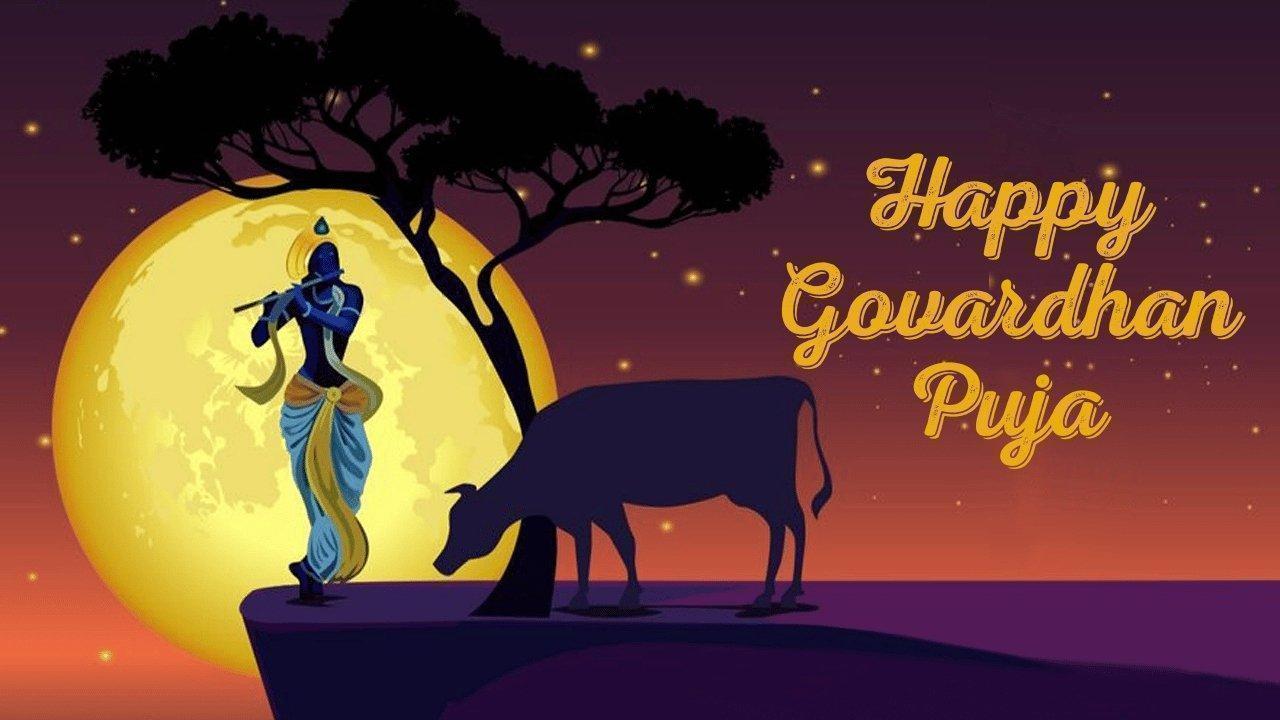You have not yet added any article to your bookmarks!

Join 10k+ people to get notified about new posts, news and tips.
Do not worry we don't spam!

Post by : Anis Farhan
Govardhan Puja, also known as Annakut or Annakoot, marks one of the most spiritually significant days in the Hindu calendar. Observed on the fourth day of Diwali, this festival carries immense cultural and religious importance across India, especially in states like Uttar Pradesh, Gujarat, Maharashtra, and Rajasthan. It commemorates the day Lord Krishna lifted the mighty Govardhan Hill to shield the people of Vrindavan from torrential rains sent by Lord Indra.
The story, rooted in the Bhagavata Purana, is not merely a mythological tale but a lesson in humility, gratitude, and reverence for nature. Devotees celebrate this day by offering vast quantities of food to Lord Krishna, symbolizing abundance and thanksgiving for nature’s generosity.
According to Hindu scriptures, the people of Vrindavan used to perform annual rituals to appease Lord Indra, the deity of rain, for a good harvest. However, young Krishna questioned this practice, asking why they were worshipping Indra instead of Govardhan Hill, which provided them with fertile soil, grazing land, and natural resources.
To teach them the true source of sustenance, Krishna urged the villagers to honor Govardhan Hill instead. Enraged by this defiance, Lord Indra unleashed heavy rains and thunderstorms upon Vrindavan. Krishna then lifted the Govardhan Hill with his little finger, providing shelter to the people and animals for seven days. Humbled, Indra realized his arrogance and begged forgiveness.
This event became symbolic of the victory of devotion and humility over pride and ego. The festival of Govardhan Puja thus celebrates Lord Krishna’s compassion, emphasizing the importance of living in harmony with nature.
The celebration of Govardhan Puja varies across regions, but the core rituals remain consistent. In temples and homes, devotees create symbolic replicas of the Govardhan Hill using cow dung, mud, or food. These are decorated with flowers, leaves, and miniature figures of cows and devotees.
A major highlight of the festival is the Annakut, meaning “mountain of food.” Devotees prepare a grand feast of sweets, fruits, cereals, and cooked dishes, which are offered to Lord Krishna. The food is later distributed among family members, friends, and the community, reinforcing the values of sharing and gratitude.
In Mathura and Vrindavan, the birthplace of Lord Krishna, the celebrations are grand and vibrant. Temples like Banke Bihari and ISKCON Vrindavan witness massive gatherings of devotees who sing hymns, perform aarti, and participate in devotional processions.
While the essence of Govardhan Puja remains the same, its celebration carries regional variations. In Maharashtra, the day coincides with Bali Pratipada, marking the victory of Lord Vishnu’s Vamana avatar over the demon king Bali. Gujaratis celebrate the day by worshipping their business ledgers and praying for prosperity in the coming year.
In northern India, especially in Uttar Pradesh and Haryana, people prepare large mounds symbolizing the Govardhan Hill and offer prayers with devotion. The festivities often include folk songs, dances, and reenactments of the Krishna-Indra legend, making it a vibrant community event.
Beyond rituals and festivities, Govardhan Puja carries a profound spiritual and ecological message. Lord Krishna’s teachings remind us to revere nature as a divine force. The hill, representing the Earth, sustains life through its resources, and humans must protect and cherish it rather than exploit it.
The festival also reinforces the value of humility. Even a mighty god like Indra was taught a lesson in pride, emphasizing that true strength lies in compassion and faith. Furthermore, the act of offering food to the deity signifies gratitude toward nature’s abundance — a tradition that aligns with sustainable living practices.
In today’s world, where environmental challenges are escalating, the message of Govardhan Puja resonates strongly. It teaches balance — between progress and preservation, faith and reason, humans and nature. The worship of Govardhan Hill becomes symbolic of protecting the planet and nurturing the ecosystems that sustain human life.
Urban communities have also adapted the festival by promoting eco-friendly celebrations, avoiding food waste, and using natural materials for decorations. Many Krishna temples around the world organize Annakut feasts using plant-based offerings, encouraging sustainability and compassion toward all living beings.
The Annakut offering is one of the grandest highlights of Govardhan Puja. The term literally translates to “a mountain of food,” representing abundance and collective gratitude. In temples like Dwarkadhish, Mathura, and ISKCON centers worldwide, devotees prepare hundreds of dishes ranging from sweets to savory delicacies, symbolizing the community’s devotion and thankfulness.
The offerings include items like laddoos, halwa, kheer, puri, sabzi, fruits, and other traditional foods. The sight of the food mountain, often intricately arranged in steps before the deity, creates an awe-inspiring spiritual experience. Once the offering is made, devotees share the prasadam, reinforcing the principles of unity, equality, and divine sharing.
The celebration of Govardhan Puja has transcended borders. From London to New York, Melbourne to Dubai, Krishna temples across the world celebrate this day with immense devotion. The ISKCON temples especially host large Annakut ceremonies featuring hundreds of dishes, devotional music, and dance performances.
The growing global awareness of the festival also reflects how its values of gratitude, humility, and ecological respect appeal to all, regardless of background or faith. Through such celebrations, Govardhan Puja continues to unite communities under the message of spiritual harmony and environmental reverence.
Govardhan Puja exemplifies how ancient traditions can inspire modern values. The festival’s core message — to respect nature and express gratitude — aligns with contemporary discussions around climate consciousness and sustainable living.
Communities use this occasion to promote tree planting, water conservation, and animal welfare activities, blending spirituality with environmental responsibility. The collective participation also strengthens social bonds, reminding everyone that festivals are not just religious observances but moments of togetherness and shared humanity.
Govardhan Puja continues to stand as a timeless reminder of faith, humility, and respect for nature. It urges people to recognize the divine presence in the natural world and to live in harmony with it. Through devotion, food, and community bonding, the festival bridges the past and present, reminding us that spirituality is not about rituals alone but about gratitude and stewardship of the Earth.
As people across India and beyond celebrate Govardhan Puja 2025, they carry forward Lord Krishna’s message — that true worship lies in kindness, humility, and care for the planet that nurtures us all.
This article is based on cultural, mythological, and religious traditions associated with Govardhan Puja. Interpretations and practices may vary across regions and communities.










Top Sci-Fi Movies Streaming on Netflix This February: Must-Watch Picks for Genre Fans
A curated news-style guide to the best science fiction films currently available on Netflix in Febru

BCCI Central Contracts Shake-Up: Kohli, Rohit Moved to Grade B as Board Reshapes 2025–26 List
Virat Kohli and Rohit Sharma have been placed in Grade B in the BCCI’s 2025–26 central contract list

Dalal Street Spotlight: Top 10 Stocks Investors Are Watching as Markets Open on a High
Indian stock markets begin the week with strong momentum, and several blue-chip and mid-cap stocks a

Market Movers Today: Key Stocks Set To Watch In Indian Markets
Indian equity markets are poised for active trading as several major companies, including Bharti Air

Milan Welcomes the World: Inside the Grand Opening Ceremony of the 2026 Winter Olympics
The 2026 Winter Olympics opening ceremony in Milan marked a defining moment for global sport, blendi

Unfolding Market Drama: Sensex & Nifty Trade Volatility Amid Budget Fallout and India-US Trade Breakthrough
Indian equity markets exhibited high volatility this week as the 2026 Union Budget triggered sharp s